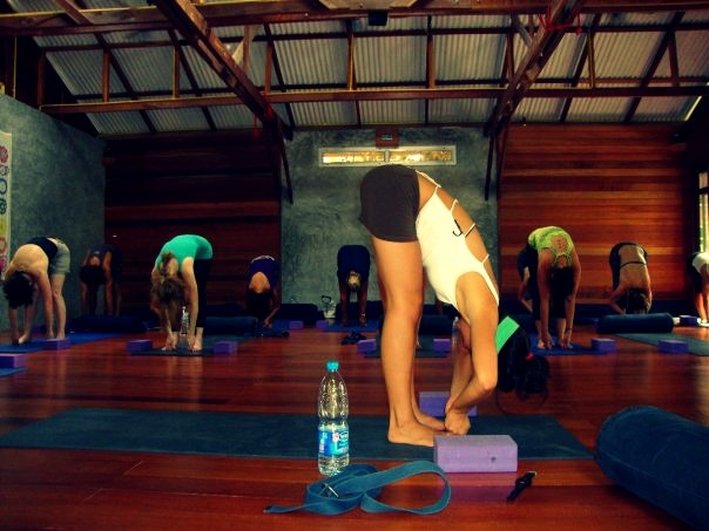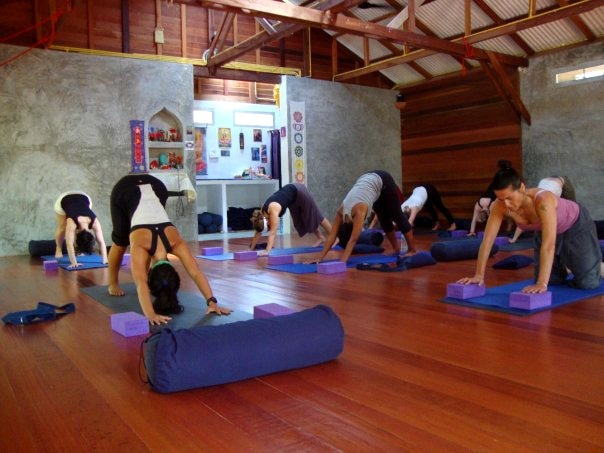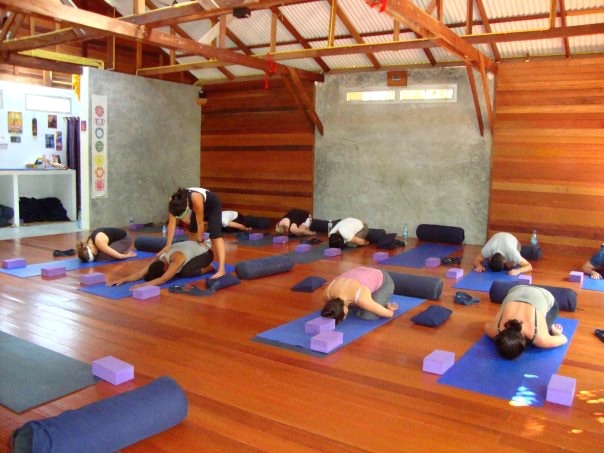I write this as a yoga teacher, and as a yoga student. I write this as a dietitian and nutritionist who sees the women and girls in clinic at the back end of yet another gruelling 10-day juice fast, or another winter freezing through raw foods; their thyroid, adrenals, and/ or reproductive health just a bit more depleted.
Their relationship with food and their body having slid yet another few degrees backwards into disordered and potentially dangerous territory.
Their self-confidence and self-trust bruised and just a bit weaker. Some of these people are yoga teachers themselves.
I write this with deep concern and remorse for any past student to whom I may have passed on potentially harmful nutrition advice before I learnt more about diet culture. I'm sorry. I didn't know that diet culture, and the body hatred and dysfunction around food it creates, was such an insidious and widespread problem.
I have been on both the giving and receiving end of bad nutritional advice from yoga teachers. I don't remember a specific incident of telling a student, "wanna lose weight? do this cleanse!", but I do remember recommending a particular book containing what I thought were healthy recipes - a book which also happened to contain extremely dangerous dietary advice along the lines of "eat just one meal a day for optimum health". Not a great blanket recommendation nor goal to aspire to.
I know that posting this is going to piss some people off. But if I can prevent just one more confused, health-conscious woman (and increasingly, man) from being more deeply sucked into diet culture, then it's worth it.
What the EFF is diet culture?
Diet culture encompasses all the messages that tell us that we’re not good enough in the bodies we have, and we’d be more worthwhile and valuable if our bodies were different. Our culture is SO embedded with body- and weight-centric messages that they’re sometimes imperceptible. Diet culture is deeply ingrained in our everyday existence and prevents us from living our most full and meaningful lives.
There's health-conscious, and then there's health-obsessed. And increasingly I'm seeing more and more yogis, especially younger women, crossing over into health-obsessed territory. I know what it looks like because I've been there. I think that as yoga teachers we need to be vigilant of this, and to be very careful about the health advice we give outside of our specialty of yoga practice.
A STORY OF two WOMEN
Scene 1
Picture this. I'm wrapping up a nutrition consultation with a client, let's call her Mrs X. As her dietitian, we've discussed lots of stuff about food, body cues of hunger and fullness, Mrs X's health issues relevant to her eating - y'know, that sort of thing.
What we haven't discussed is the stress fracture in the C3 vertebra in her neck, and the inflamed tendons in her wrists, because she has other health practitioners who deal with that, and we only have 30 minutes together.
On her way out, Mrs X casually adds that she's thinking of trying yoga to help manage her stress levels and give her energy. "Oh, yes!" I exclaim, "yoga totally saved me! I find doing headstands just zens me out so much! And handstands give me tonnes of energy. You should try that!"
Obviously, this would be a major dietitian FAIL because I'm not a yoga teacher (well actually I am, but for the purpose of the point I'm trying to make - and to represent the majority of nutritionists - let's pretend I'm not, okay?).
I don't know enough about Mrs X's health to know that what works for me, will also work for her.
I might know about her digestive and eating issues, but I know next to nothing about her history of injuries to safely recommend specific yoga postures for her to try. In this case, telling Mrs X to do advanced poses like handstands and headstands would be the equivalent of telling someone with coeliac disease to go eat a few loaves of bread: it could really fuck her up.
Luckily, I don't know any nutritionists who would actually do this. And if they do suggest yoga it's as a general tool to try for stress management, on the premise that you go ask a yoga teacher for further modifications if you have injuries.
Scene 2
Okay, now picture this. Miss Y is at her local yoga studio, just finishing up a yoga class. She's feeling zenned out and all open-hearted after her savasana. She thanks her yoga teacher on the way out, and they chat animatedly as they both bask in that delicious post-yoga glow.
What they don't discuss is Miss Y's declining relationship with food, which is now bordering on an eating disorder, or her roller coaster blood sugar levels, or the fact she hasn't had a menstrual period in months because she's under eating in an attempt to lose weight.
"I loved your class! I love you!" Miss Y is literally high on yogi feel-good vibes (a real thing) and anything her teacher says at this point will be taken as gospel. Yoga teacher smiles serenely. Miss Y casually adds that she loved the class, and if only her energy levels were a *bit* higher, she could have tried the headstand.
"Oh," says yoga teacher, "you should try a juice fast. I did a 5-day fast and I feel ah-mazing! I have so much energy, I do them regularly. I've even lost that little belly I'd been carrying for ages around that I could never lose. You should try it!"
Obviously, this would be a major yoga teacher FAIL.
And it happens. All. The. Time.
Yoga teachers, I get it. You open people up through the practice. You witness melt downs. You're privy to the psychological issues and deep seated secrets disclosed to you by students in their moments of post yoga glow-induced vulnerability.
Sometimes, the relief you bring by helping them to relax and breathe is so great, you assume the role of HEALTH GURU OF EVERYTHING in their eyes. You are a magical, perfect, sparkly unicorn of health and life wisdom who poos (non GMO) glitter. So it's not uncommon for people to ask you if they should leave that abusive man. Or try yoni steaming. Or go on a detox. Or try a ketogenic supplement.
But unless you are willing to be liable for any decision your student makes based on your advice, you shouldn't tell them what to do. Instead, suggest they seek help from a counsellor, psychologist, or nutritionist, or whatever.
Most yoga teachers I know would do just that. But not all. Every situation I describe at the end of this blog is based on what a yoga teacher has actually done or said in a class I or close friends have personally attended.
Is it ethical?
On first glance, the yamas and niyamas can be glossed over as "basics". "I tell the truth, and I'm not violent," we justify to ourselves.
But on reflection these principles can be applied at a deeper and perhaps more powerful level as we grow in self-awareness. Violence, stealing, and dishonesty have subtler manifestations. Practicing the yama of non-violence (ahimsa), for example, could be interpreted as being awake to the more subtle ways we harm ourselves and others through colluding with diet culture and body hatred, which thrive off the assumption that we aren't enough as we are right now.
And essentially, the reason why people do packaged juice cleanses, or any weight loss diet, or crazy 12 week intensive exercise challenges, is that at their core they believe they aren't good enough as they are right now. They aren't thin, clean, fit or enlightened enough, and they will pay big money for the privilege of thinking they are, finally, ENOUGH - even for a fleeting moment.
Violence isn’t just killing a person or an animal; it may also arise in the harsh ways we treat ourselves and others, such as pushing into a potentially injurious pose to keep up or compete with other students. Or convincing someone that their cruelty to animals knows no bounds unless they go vegan (in the name of ahimsa, paradoxically) or to start a juice fast to help them "release old waste" (read: lose weight).
Please, Just don't go there
So fellow yoga teachers, I implore you: please stop giving potentially harmful dietary advice to your students. You are seen as a magical rainbow person who rides unicorns, and your advice will likely be taken seriously. (The following are actual yoga-teacher-giving-terrible-nutrition-advice situations that I or people close to me have been in.)
PLEASE do not tell them they need to detoxify and alkalinise, when they reveal to you in a moment of post-yoga vulnerability that they're "desperate to lose weight". Weight loss and fad diets (including cleanses and other common detox protocols) do not take people’s individual requirements into consideration and can result in a person feeling hungry, experiencing low moods, lacking in energy levels and generally developing really poor health.
With research showing that 95% of all dieters will regain their lost weight in 1-5 years (2,3), it's impossible to advise someone to attempt any weight loss protocol on the premise that it will help them lose weight, and still stick to the yamas of ahimsa (non-harming), satya (truthfulness), and brahmacharya (maintenance of vitality).
PLEASE do not encourage them to go on a juice fast when they ask you how to increase their energy levels. Weight loss, however temporary - and the adrenaline rush of the starved state mistakenly interpreted as "increased energy" - are common results when you restrict calories in the short term (why do you think packaged juice fasts are so popular?!). So if we're honest, a juice fast is a diet. And 35% of “normal dieters” progress to pathological dieting. Of those, 20-25% progress to partial or full-syndrome eating disorders (4).
PLEASE do not pressure them to go vegan or vegetarian in order to be healthier and prove that they give a shit about animals and the environment (I'm sure they already do). Please don't simplify the vegetarian issue down to ethics alone. Whilst this is important, the biological suitability of a vegetarian or vegan diet varies WILDLY from one person to another.
In my experience, going vego can be great for some people, at certain life stages, for a certain period of time or disease state. But it's not the healthiest option for absolutely everyone contrary to what you've read/heard/believe. I feel this to be true from personal experience living as a vegetarian and vegan for a decade... but more importantly from clinical experience working with people suffering enormously from being on an innately restrictive diet for far too long. The diet that heals isn't always the diet that sustains.
Also, if you're speaking to a typical yogi you're speaking to someone who may be quite health-obsessed or orthorexic i.e. they have a decent chance of already having a disordered relationship with food, for whom vegetarianism will be just another reason to restrict even more foods from their dwindling list of "allowed" food items. The number of times I've seen this in the yoga community is staggering.
PLEASE refrain from suggesting intermittent fasting or skipping meals to improve their digestion and "release excess weight". When you tell a room full of female students to cut out at least one meal per day, you are speaking to a room of predominantly 18-42 year old women, of whom statistically 1 in 100 will have full blown anorexia nervosa, and a significant chunk will already have a disordered relationship with food.
You are speaking with a population (students and women) for which the incidence of bulimia is estimated to be 1 in 5 (5).
You are speaking to a group of women of whom, even if they are within a normal healthy weight range, only 22% are happy with their weight. Almost three quarters of these women desire to weigh less, including 68% of healthy weight and 25% of underweight women (6).
PLEASE don't write a book about detoxification, clean eating or juice cleansing and then "mention" it's now available for purchase at the end of class - you are not a nutrition expert. And even if you are, see above statistics regarding your target audience.
PLEASE don't push products onto your students in the name of health: be it your powdered vegetable juice line / "life-changing" multi-level marketed products / "food grade" essential oils / ketogenesis-inducing supplements. Even if you're totally convinced they're awesome, it's just plain unprofessional. They're here to do yoga, not become part of your downline. IF a student actively asks you about your products, and you (somehow) know for a fact that said products will not be used to perpetuate body hate, non-acceptance of and disconnection from self, then by all means pitch away.
Please, just don't go there. Because people are not just bodies, projects to be improved and slimmed down and detoxed. We are whole human beings, as our beloved yoga philosophy tries to teach us time and time again.
So. Yoga teachers: please stop giving potentially harmful dietary advice to your students.
And yoga students, please don't ask your yoga teacher what and how and when you should be eating. They don't know, because that information can only be discovered by you. Your relationship with food and your body is your business. If there's an issue with it, you should probably bring it to someone who can take your individualised requirements into consideration.
Yoga is as much about getting in touch with our bodies and its innate wisdom, as it is going beyond the body. Yoga teachers, if you want to do a 3/5/7 day juice cleanse, go raw vegan, or live on broccoli and bone broth then knock yourself out! Just don't impose your nutritional philosophies onto impressionable students when you really should just be teaching yoga.
Your students look up to you, they are listening, they are absorbing not only your dietary advice, but your own unresolved neuroses and food hang ups, should you have any.
Sure, advise people to eat healthily and treat their bodies with respect. But IF and HOW they do that is their journey and it's not your place to intervene.
Yoga teachers, if you are called upon to give any nutritional advice, make it an extension of the original yoga philosophy of knowing and trusting oneself, not an extension of your latest detox. Direct them to some non-diet approaches such as Health At Every Size® or Intuitive Eating, the Body Positive movement, or any number of arising approaches and practitioners that take a whole person's health into account, not just how good they look in a pair of Lululemon tights or how clean their gut is.
References
- Penman, S., Cohen, M., Stevens, P., & Jackson, S. (2012). Yoga in Australia: Results of a national survey. International Journal of Yoga, 5(2), 92–101.
- Wade, T.D, Bulik, C.M., Neale, M., Kendler, K.D. (2000)Anorexia Nervosa and Major Depression: Shared Genetic and Environmental Risk Factors. American Journal of Psychiatry 157(3), 469-471
- Grodstein, F., Levine, R., Spencer, T., Colditz, G. A., &Stampfer, M. J. (1996). Three-year follow-up of participants in a commercial weight loss program: Can you keep it off? Archives of Internal Medicine 156(12), 1302.
- Neumark-Sztainer D., Haines, J., Wall, M., & Eisenberg, M. ( 2007). Why does dieting predict weight gain in adolescents? Findings from project EAT-II: a 5-year longitudinal study. Journal of the American Dietetic Association, 107(3), 448-55.
- The National Eating Disorders Collaboration. (2012a). Eating disorders in Australia. Sydney: NEDC.
- Kenardy, J., Brown, W. J., & Vogt, E. (2001). Dieting and health in young Australian women. European Eating Disorders Review 9, 242-254.




































 RSS Feed
RSS Feed



